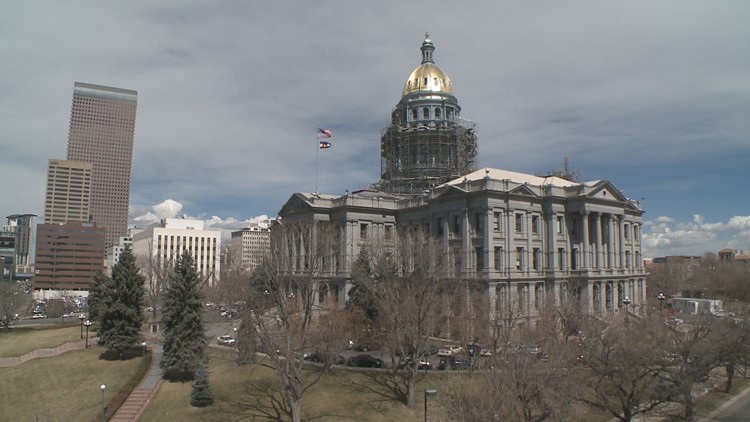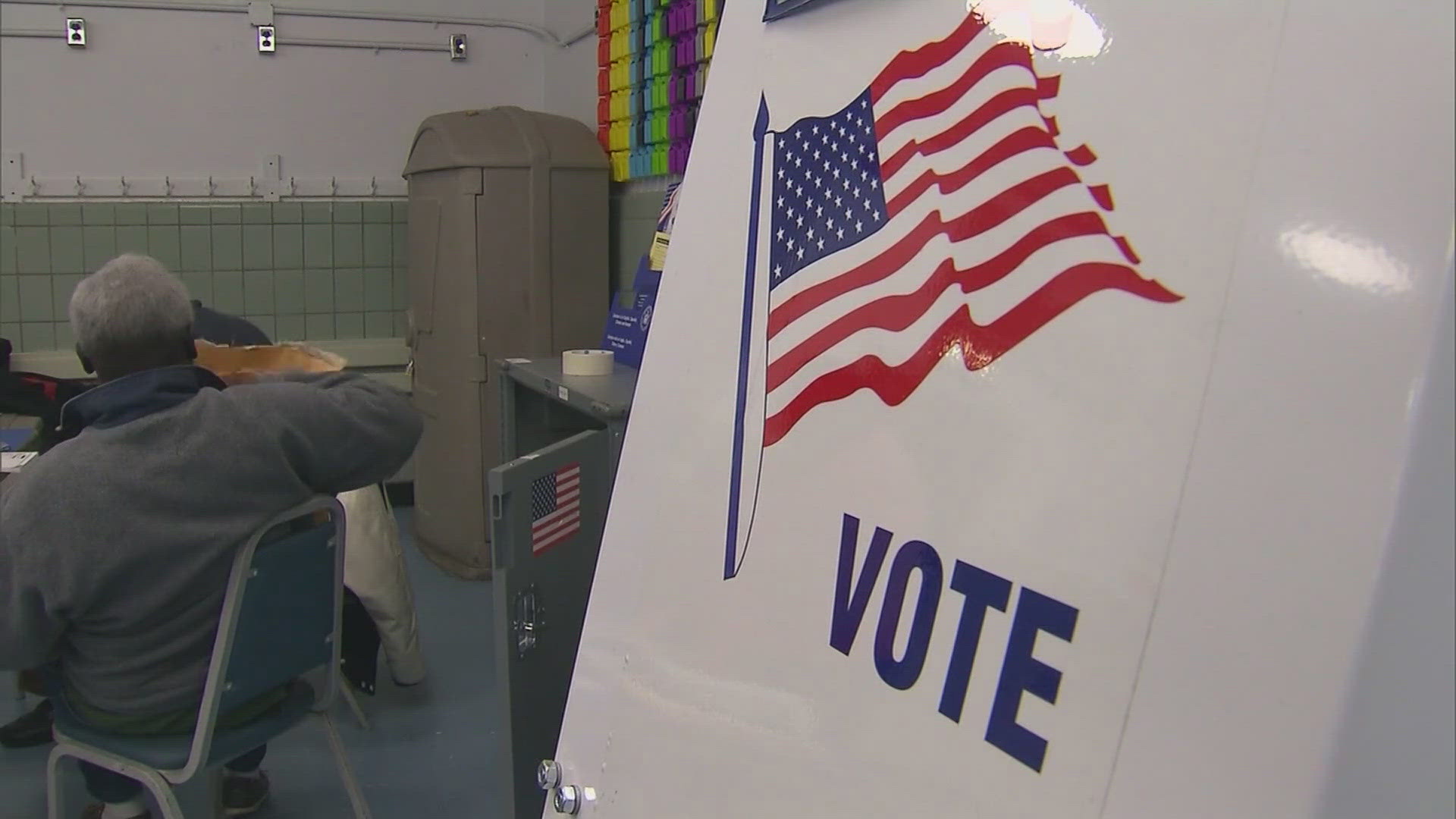This story is part of the 9NEWS voter guide
Colorado voters have a lot to process with nine statewide ballot questions up for a vote this November.
Voters will determine whether we raise the minimum wage, create a universal health coverage system and allow people with terminal diseases access to life ending medications.
What follows is an overview of each of the questions. You can read more detail about each of these initiatives and amendments as analyzed by the nonpartisan staff at the Colorado Legislative Council. The agency produces the official blue book voter guide.
UNIVERSAL HEALTHCARE (Amendment 69)
What it would do: Replaces most private health insurance with a state-run, single-payer system called ColoradoCare that would be paid for through new income and payroll taxes and run by an elected board. The new tax would be 10 percent and raise an estimated $25 billion, an amount roughly equal to all state spending. On wage income, the new tax would be divided between companies and their workers: employers would pay 6.67 percent with the employee paying 3.33 percent.
What supporters say: The state-run system would be better than paying premiums to private-sector insurance companies. “ColoradoCare brings health care to hundreds of thousands of Coloradans who are currently uninsured, saves thousands and tens of thousands of dollars in health care costs for individuals and families ($4.5 billion saved annually), and improves the comprehensive health care benefits for all Coloradans,” spokesman Owen Perkins said. “A yes vote gets the corporate insurance industry and politicians out from between you and your doctor. No deductibles, no insurance premiums, and no ‘narrow networks.’ ColoradoCare saves money and saves lives.”
What opponents say: “ColoradoCare is fiscally unsustainable,” Coloradans for Coloradans spokesman Sean Duffy said. “ColoradoCare advocates ask voters to just trust them on this risky experiment with the healthcare for millions of Coloradoans – despite evidence in [the Colorado Health Institute] study and the experience in Vermont when the pro-single-payer Governor shelved their version of Amendment 69 when it was deemed potentially devastating to the state’s economy.”
RAISING THE MINIMUM WAGE (Amendment 70)
What it would do: The state’s minimum wage would rise incrementally until it hits $12 per hour on Jan. 1, 2020. (To read how it’s working in other states, click here.)
What supporters say: “Colorado’s cost of living has skyrocketed but the minimum wage hasn’t kept up,” according to the Colorado Families for a Fair Wage campaign. “Coloradans working full-time, skilled jobs like nursing assistants, preschool teachers, EMTs and caregivers for the elderly/disabled bring home less than $300 per week -- not enough to cover even the basics for their families.
Raising the minimum wage gradually to $12 over four years will give workers extra money in their pockets to spend on Main Street -- boosting local businesses and creating jobs.”
What opponents say: Raising the minimum wage would hurt rural communities and small businesses, Keep Colorado Working spokesman Tyler Sandberg said.
His group cites a Common Sense Policy Roundtable report that Colorado would lose about 90,000 jobs if the minimum wage rises to $12 an hour.
MAKING IT HARDER TO AMEND COLORADO’S CONSTITUTION (Amendment 71)
What it would do: People hoping to amend the state constitution in the future would have to gather signatures each of Colorado’s 35 state Senate districts and get 55 percent of the vote on Election Day. Currently, campaigns must gather signatures from five percent of the voting population (it’s 5 percent of the number who voted for Secretary of State, which currently amounts to 98,492 signatures) and pass new amendments with a simple majority.
What supporters say: “Colorado has the easiest constitution to amend in America and it makes our state vulnerable to special interests looking to advance their agendas,” spokesman Rich Coolidge said. “Coloradans agree that it should be harder to amend the constitution than change a law and the process should involve everyone in Colorado.”
What opponents say: “The costs of doing an initiative for citizens or private interests will go up astronomically. It could go from $2 to $20 a signature or more. And the gerrymandering of districts mean certain initiatives would never get on the ballot,” Robert Smoke said. “The proponents of Amendment 71 are being deceptive at a core level … They are destroying the process.”
TOBACCO TAXES (Amendment 72)
WATCH: A debate on Amendment 72
What it would do: Cigarette taxes in Colorado would triple, with the new taxes predicted to raise more money than recreational marijuana currently does. The money would go to anti-tobacco and health campaigns, much of which would be awarded through state grants.
What supporters say: “Passing this measure will save lives,” Children’s Hospital Colorado Dr. Chris Stille said in a statement. “It will stop tobacco companies from getting more kids addicted, and it will make a historic investment in health care programs and medical research to help Coloradans most affected by smoking and to create healthier communities for future generations.”
What opponents say: “[NoOnAmendment72.com] Amendment 72 inserts a blank check for $315 million dollars into our Colorado State Constitution for spending programs that haven’t even been determined yet, and less than 20 percent of the new revenue is dedicated to helping people stop smoking,” spokeswoman Michelle Balch Lyng said. “Voters deserve to know exactly how this new tax money will be spent and that it won’t be wasted. We should not allow special interests to misuse our constitution and our tax dollars the way this constitutional amendment does."
PRESCRIPTION ASSISTED SUICIDE (Proposition 106)
WATCH: A debate on Proposition 106
What it would do: Terminally ill people with six months or less left to live would be able to obtain prescriptions for self-administered medications to end their lives.
What supporters say: “Sometimes even the best care cannot relieve pain and suffering, and people in that situation should have a range of options,” Colorado End of Life Options spokeswoman Holly Cook said. “The measure would take government out of personal end-of-life decisions and allow patients to make their own choices about their health care with input from their families, doctors and faith.
What opponents say: “I think the biggest issue is they do not have enough safeguards,” Not Dead Yet Colorado spokeswoman Claire Ann Lucas said.
Specifically, Lucas is concerned that a doctor doesn’t have to be present when someone takes the medication, a family member who stands to inherit can sign documents stating a person is of sound mind and the medications themselves can be problematic.
“These are some of the same medications used for lethal injections,” Lucas said. “Sometimes people have not passed away; sometimes people have vomited.”
PRESIDENTIAL PRIMARY ELECTIONS (Proposition 107)
WATCH: A debate on Proposition 107
What it would do: Coloradans would get to vote for their party’s presidential nominee in a state-run primary election that would happen before the third Tuesday in March rather than in caucuses run by the political parties.
What supporters say: Colorado voters are “left out” of the presidential primary process every four years, and the primary election would increase the attention candidates pay to Colorado.
What opponents say: “Caucuses puts the power in the hands of the people. Without the caucuses, it becomes party bosses,” Save the Caucus spokesman John Wren. “The other benefit it gives the average, ordinary person the best chance to run for office. A primary favors big money, big power putting their people in. I think we have much better local government because we have the caucus. And the presidential primary will kill the caucus.”
OPEN PRIMARY ELECTIONS (Proposition 108)
WATCH: A debate on Proposition 108
What it would do: Give Colorado residents who aren’t registered with a party the opportunity to vote in one party’s primary elections without registering with a party. More than a third of the state’s voters are unaffiliated.
What supporters say: "Colorado voters value independence and want elections that encourage participation,” Let Colorado Vote Campaign Chair Kent Thiry said in a statement. “Only 5 percent of voters participated in the March caucuses, which is not a sign of a healthy democracy. Our initiatives will fix that and allow more than 1 million unaffiliated voters to participate in elections that they currently pay for, but thus far have been excluded from.”
What opponents say: “Under an open primary system … party members would lose the ability to choose candidates who reflect the distinctive values of the party to which they belong ... The political party thus loses the ability to stand candidates who offer ideas to the public who express its distinctive values and beliefs. What, one might say, is then the point of having political parties? The open primary effectively undermines political parties as communities of shared belief. As such, it is also a fundamental blow to freedom of association,” according to Save the Caucus founder John Wren.
REMOVE SLAVERY FROM CONSTITUTION (Amendment T)
What it would do: Remove a line from Colorado’s state constitution that permits slavery as punishment for a crime.
What supporters say: “The section of the Colorado Constitution that allows slavery and involuntary servitude as punishment for a crime should be updated because it represents a time in the United States when not all people were seen as human beings or treated with dignity,” according to the legislative ballot analysis. “Removing the language reflects fundamental values of freedom and equality, and makes an important symbolic statement.”
What opponents say: “Amendment T may result in legal uncertainty around current offender work practices in the state,” according to the legislative ballot analysis. “Prison work requirements provide structure and purpose for offenders, while enabling skill building and helping to reduce recidivism. Community service programs allow offenders to engage with the community and make amends for their crimes. Such practices have a place in the correctional system, and legal challenges resulting from the passage of Amendment T could put the application of these practices in jeopardy.”
PROPERTY TAX EXEMPTION (Amendment U)
What it would do: Create a tax exemption for people or private firms that earn less than $6,000 in profits from leasing government land or other property starting in 2018.
What supporters say: “Amendment U reduces the administrative burden of collecting a tax that in many cases costs more to collect than it brings in to local governments,” according to the legislative ballot analysis. “For example, the majority of possessory interests in the state are for agricultural leases, many of which are charged less than $10 in property taxes. The cost of administering this tax — mailing notices, maintaining tax rolls, and collecting and enforcing the tax — often exceeds this amount.”
What opponents say: “Amendment U provides an unfair tax break for businesses and individuals who use government-owned land for their private financial benefit, and puts a greater tax burden on others to pay for local government services,” according to the legislative ballot analysis. “The state constitution requires that local taxing districts collect taxes uniformly for all taxpayers. A small tax bill does not justify exempting businesses or individuals from paying the tax on the private benefit they enjoy on government land.”



